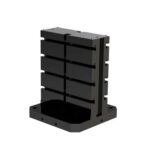Introduction to Capacitor Circuit Simulator
A capacitor circuit simulator is a powerful tool used by electrical engineers, students, and hobbyists to analyze and understand the behavior of circuits containing capacitors. It allows users to create virtual circuits, modify component values, and observe the resulting voltages, currents, and other parameters without the need for physical components or a laboratory setup.
Capacitors are essential components in many electronic circuits, including power supplies, signal filtering, and energy storage applications. They store electrical energy in the form of an electric field and can be used to smooth out voltage fluctuations, couple AC signals, and create time delays.
How Capacitor Circuit Simulators Work
Capacitor circuit simulators use mathematical models and numerical methods to solve the equations governing the behavior of capacitors in a circuit. These simulators typically employ techniques such as nodal analysis or modified nodal analysis to determine the voltages and currents at various points in the circuit.
The user interface of a capacitor circuit simulator usually consists of a schematic editor, where users can place components and create connections between them. The simulator then uses the entered component values and circuit topology to generate a set of equations that describe the circuit’s behavior.
Common Features of Capacitor Circuit Simulators
- Schematic editor for creating and modifying circuits
- Component libraries containing various types of capacitors and other components
- Ability to specify component values and initial conditions
- Time-domain and frequency-domain analysis options
- Graphical and tabular output of simulation results
- Parameter sweeps and optimization tools for circuit design and analysis
Types of Capacitor Circuit Simulators
There are several types of capacitor circuit simulators available, each with its own strengths and limitations. Some of the most common types include:
SPICE-based Simulators
SPICE (Simulation Program with Integrated Circuit Emphasis) is a widely used open-source circuit simulation software. Many commercial and free capacitor circuit simulators are based on SPICE or its derivatives. These simulators offer a wide range of analysis options and are known for their accuracy and reliability.
Examples of SPICE-based capacitor circuit simulators include:
- LTspice
- PSpice
- NgSpice
- TINA-TI
Web-based Simulators
Web-based capacitor circuit simulators are accessible through a web browser and do not require any software installation. These simulators are often less feature-rich than their desktop counterparts but offer a convenient way to quickly analyze simple circuits.
Examples of web-based capacitor circuit simulators include:
- CircuitLab
- EasyEDA
- PartSim
- Falstad Circuit Simulator
Matlab/Simulink-based Simulators
Matlab and Simulink are powerful numerical computing environments that can be used to create custom capacitor circuit simulators. These simulators offer a high degree of flexibility and can be integrated with other Matlab toolboxes for advanced analysis and optimization.
Examples of Matlab/Simulink-based capacitor circuit simulators include:
- Simscape Electrical
- Simulink Simscape
- PSIM
Applications of Capacitor Circuit Simulators
Capacitor circuit simulators are used in a wide range of applications, from basic circuit design to advanced research and development. Some of the most common applications include:
Educational Purposes
Capacitor circuit simulators are valuable tools for teaching and learning about electrical circuits. They allow students to experiment with different circuit configurations and observe the effects of changing component values without the need for physical components or lab equipment.
Circuit Design and Optimization
Engineers and designers use capacitor circuit simulators to test and optimize their designs before building physical prototypes. By simulating the circuit’s behavior under various conditions, designers can identify potential issues and make necessary adjustments to improve performance, reliability, and cost-effectiveness.
Troubleshooting and Debugging
When troubleshooting or debugging a malfunctioning circuit, capacitor circuit simulators can be used to isolate the problem and test potential solutions. By comparing the simulated behavior with the observed behavior of the physical circuit, engineers can quickly identify and correct issues.
Research and Development
Capacitor circuit simulators are essential tools in the research and development of new technologies and applications. They enable researchers to explore novel circuit designs, test hypotheses, and validate experimental results without the need for costly and time-consuming physical experiments.

Limitations of Capacitor Circuit Simulators
While capacitor circuit simulators are powerful and versatile tools, they do have some limitations that users should be aware of:
- Simulators rely on mathematical models, which may not perfectly represent the behavior of real-world components and systems.
- Some simulators may not include advanced features or models for specific types of capacitors or other components.
- Simulation accuracy depends on the quality of the component models and the user’s ability to correctly specify the circuit and its parameters.
- Complex circuits with a large number of components may require significant computational resources and time to simulate accurately.
Despite these limitations, capacitor circuit simulators remain an indispensable tool for anyone working with electrical circuits containing capacitors.
Getting Started with Capacitor Circuit Simulators
To get started with capacitor circuit simulators, follow these steps:
- Choose a simulator that meets your needs and is compatible with your operating system and hardware.
- Install the simulator software or access the web-based simulator through your browser.
- Familiarize yourself with the user interface and the available components and analysis options.
- Start with simple circuits and gradually work your way up to more complex designs.
- Experiment with different component values and configurations to gain a better understanding of how capacitors affect circuit behavior.
- Consult the simulator’s documentation, tutorials, and user forums for guidance and troubleshooting assistance.
Conclusion
Capacitor circuit simulators are essential tools for anyone working with electrical circuits containing capacitors. They offer a convenient and cost-effective way to analyze, design, and troubleshoot circuits without the need for physical components or lab equipment.
By understanding the capabilities and limitations of these simulators and following best practices for their use, engineers, students, and hobbyists can unlock the full potential of these powerful tools and accelerate their learning and development in the field of electrical engineering.
FAQs
-
What is a capacitor circuit simulator?
A capacitor circuit simulator is a software tool that allows users to create, analyze, and optimize electrical circuits containing capacitors without the need for physical components or lab equipment. -
What are the benefits of using a capacitor circuit simulator?
Capacitor circuit simulators offer several benefits, including cost and time savings, the ability to test and optimize designs before building physical prototypes, and the convenience of experimenting with different circuit configurations and component values. -
What types of capacitor circuit simulators are available?
There are several types of capacitor circuit simulators available, including SPICE-based simulators, web-based simulators, and Matlab/Simulink-based simulators. Each type has its own strengths and limitations, and the choice of simulator depends on the user’s specific needs and preferences. -
What are some common applications of capacitor circuit simulators?
Capacitor circuit simulators are used in a wide range of applications, including educational purposes, circuit design and optimization, troubleshooting and debugging, and research and development. -
Are there any limitations to using capacitor circuit simulators?
Yes, capacitor circuit simulators have some limitations, such as relying on mathematical models that may not perfectly represent real-world behavior, potential lack of advanced features or models for specific components, and the need for significant computational resources and time for simulating complex circuits accurately. However, these limitations do not diminish the overall usefulness and importance of these tools in the field of electrical engineering.
| Simulator Type | Examples | Key Features |
|---|---|---|
| SPICE-based | LTspice, PSpice, NgSpice, TINA-TI | Wide range of analysis options, accuracy, reliability |
| Web-based | CircuitLab, EasyEDA, PartSim, Falstad Circuit Simulator | Accessible through web browser, convenient for simple circuits |
| Matlab/Simulink-based | Simscape Electrical, Simulink Simscape, PSIM | High flexibility, integration with Matlab toolboxes for advanced analysis and optimization |






Leave a Reply